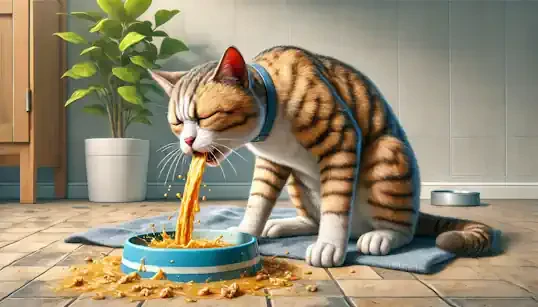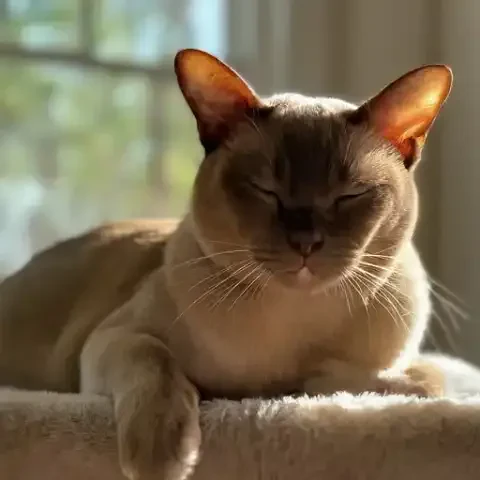You wake up to that distinctive, guttural retch, or perhaps you simply stumble upon an unwelcome damp patch on your favorite rug – cat vomit. For any cat owner, the discovery of feline vomit is a fairly common event, yet it always manages to trigger a little pang of worry. It’s an experience shared by countless households, a somewhat unavoidable aspect of living with these often-enigmatic creatures. The immediate question that springs to mind is, “Why?” Why do cats vomit, and perhaps more importantly, is this particular instance a cause for genuine alarm? Understanding the myriad reasons behind feline vomiting, from the mundane to the more serious, is key to being a proactive and informed cat owner. It empowers you to differentiate between a minor digestive hiccup that will resolve on its own and a situation that warrants immediate veterinary attention. This knowledge is not just about cleaning up unpleasant messes more efficiently; it's about being your cat’s best advocate, recognizing subtle shifts in their health, and ensuring their well-being. This article aims to demystify the often-perplexing phenomenon of cat vomiting. We will explore the common culprits behind those regurgitated meals and expelled fluids, ranging from the entirely benign to those that signal a potential health concern. We’ll delve into the usual suspects, the less serious reasons for vomiting, and then navigate into the more concerning causes, helping you discern when it’s appropriate to monitor at home and, crucially, when it’s time to seek professional veterinary help. By understanding the nuances of feline vomiting, you can move from a place of uncertainty and worry to one of informed action, ensuring your feline companion remains healthy, comfortable, and by your side for many years to come.
Let's begin by exploring some of the most common and generally less worrisome reasons why your cat might be vomiting. These are the “usual suspects,” the everyday occurrences that can lead to an episode of feline regurgitation and often resolve without significant intervention. First, and perhaps most notoriously, we have hairballs. The quintessential feline vomit, hairballs are a classic consequence of a cat’s meticulous grooming habits. As cats groom themselves, their barbed tongues effectively trap loose hair, which is then swallowed. While some of this ingested hair passes through the digestive tract and is eliminated in the stool, a portion can accumulate in the stomach, forming dense clumps. These hairballs, being indigestible, can irritate the stomach lining. When the irritation reaches a certain threshold, the body’s natural response is to expel the hairball through vomiting. The typical appearance of a hairball vomit is quite distinctive: often cylindrical or tube-shaped, reflecting the passage through the esophagus, and visibly containing clumps of hair intermixed with undigested food or yellowish bile. Occasional hairballs are generally considered within the realm of “normal” for many cats, particularly long-haired breeds or those who are avid groomers. Perhaps an episode once every month or two might not be cause for immediate panic. However, it’s crucial to differentiate between occasional hairballs and frequent hairball vomiting. If your cat is producing hairballs more frequently than once a month, or if they seem to be struggling excessively to bring one up, or if hairballs are accompanied by other concerning symptoms like lethargy or loss of appetite, it’s no longer considered a normal occurrence and warrants veterinary attention. Next on our list of common culprits is the rather unglamorous phenomenon known as “scarf and barf,” or eating too fast. This is a remarkably simple yet surprisingly frequent reason for feline vomiting. When a cat eats their food too rapidly, they can overwhelm their stomach’s capacity. The quick influx of food, especially if gulped down in large chunks, can trigger a regurgitation or vomiting reflex shortly after the meal. Why do cats eat so fast? There can be several contributing factors. In multi-cat households, competition for food can drive some cats to bolt down their meals before others can get to it. Simple hunger, especially if meals are spaced far apart, can also lead to rapid eating. Sometimes, it’s simply a learned habit or even a manifestation of stress or anxiety around mealtimes. The vomit associated with eating too fast is typically easy to recognize. It usually consists of undigested or only partially digested kibble or wet food, often expelled very soon after eating, within minutes or up to an hour or so. It often retains a tubular shape, indicating it hasn’t spent long in the stomach and is more of an esophageal regurgitation than true vomiting. “Scarf and barf” episodes tend to be predictable, often occurring consistently after meals, particularly if the cat is fed in the same way and the underlying cause (like competition) isn’t addressed. While a single episode might be nothing to worry about, if your cat consistently vomits after eating quickly with every meal, or if they are losing weight despite eating, or if the rapid eating and vomiting is accompanied by other symptoms, it’s important to investigate further with your veterinarian. Simple solutions like slow feeder bowls, which are designed to slow down eating speed, or providing smaller, more frequent meals, and creating a calmer, less competitive mealtime environment can often resolve this issue.
Another common and often self-limiting cause of vomiting in cats is dietary indiscretion, or simply eating something “off.” Cats, being naturally curious creatures, sometimes explore their world with their mouths, and this exploration can occasionally lead them to ingest things they shouldn’t. This could range from nibbling on spoiled food left out, raiding the garbage can for enticing (but questionable) scraps, sampling houseplants (many of which are toxic, as we’ll discuss later), or even consuming insects while hunting. Eating something “off” or indigestible can irritate the stomach lining, leading to digestive upset and vomiting as the body attempts to expel the offending material. The appearance of vomit caused by dietary indiscretion is highly variable, depending on what exactly the cat ingested. It might contain undigested food, recognizable plant matter if they’ve been chewing on greenery, insect parts if they’ve been hunting, or simply be bile-stained. Often, it’s a one-time event, associated with the ingestion of a particular item. Dietary indiscretion vomiting is often a one-off episode, meaning your cat might vomit once and then return to normal behavior. If the vomiting is indeed due to a mild dietary upset, it typically resolves within a few hours to a day, with the cat returning to their usual appetite and activity levels. However, it’s important to be vigilant. If the vomiting is persistent, if large quantities are vomited, if there’s blood in the vomit, or if your cat becomes lethargic, develops diarrhea, or exhibits any other concerning symptoms, it’s essential to seek veterinary advice promptly, as it could indicate a more serious issue than just a mild stomach upset. Dietary sensitivities or food intolerances are another potential reason for vomiting in cats, and this can be a more chronic and recurring issue. In these cases, a cat’s digestive system reacts negatively to a specific ingredient or component in their food. This reaction is often not a true allergy (which involves the immune system in a different way) but rather a digestive sensitivity or intolerance to a particular food ingredient. Common culprits can include certain protein sources like beef, chicken, or fish, or ingredients like grains or artificial additives in their food. The exact reasons behind food sensitivities are complex and not always fully understood but can involve both immune system responses and digestive system sensitivities. The appearance of vomit due to food sensitivity can be quite variable. It may contain undigested food, bile, or mucus. Often, vomiting related to food sensitivities is not a one-time event but rather recurrent. Your cat may vomit intermittently, especially after eating the food containing the offending ingredient. Food sensitivity vomiting is often accompanied by other gastrointestinal signs, such as diarrhea, increased gas, or even skin-related issues like itching and poor coat quality. If you suspect a food intolerance is causing your cat’s vomiting, it’s crucial to consult with your veterinarian. Diagnosing food sensitivities often involves food elimination trials, where you work with your vet to switch your cat to a novel protein or hypoallergenic diet and gradually reintroduce potential allergens to pinpoint the culprit ingredient. Managing food sensitivities typically involves long-term dietary changes, often requiring feeding a specialized hypoallergenic or novel protein diet to avoid the triggering ingredient. Finally, a surprisingly simple yet often overlooked cause of vomiting is a sudden diet change. Abruptly switching your cat from one type of food to another, even if both are high-quality cat foods, can upset their delicate digestive system and lead to vomiting. The feline digestive system, like all digestive systems, relies on a complex balance of gut bacteria to properly digest food. Sudden dietary changes can disrupt this bacterial balance, leading to gastrointestinal upset, including vomiting. The vomit associated with a sudden diet change is typically undigested or partially digested food, often occurring shortly after the introduction of the new food. This type of vomiting is usually temporary and resolves within a day or two as the cat’s digestive system gradually adjusts to the new diet. The solution, of course, is prevention. When transitioning your cat to a new food, always do so gradually over a period of 7-10 days. Slowly mix increasing amounts of the new food with decreasing amounts of the old food, allowing the digestive system to adapt gradually to the change, minimizing the risk of vomiting and other digestive upsets. While these common reasons for cat vomiting can be concerning to witness, it is important to remember that occasional vomiting from these causes can be normal or easily addressed. However, persistent, frequent, or severe vomiting is never considered normal and warrants further investigation to rule out more serious underlying medical conditions.
Now, let's turn our attention to the more concerning causes of cat vomiting, situations where feline regurgitation can be a red flag, signaling a potential underlying health problem that requires veterinary attention. While occasional vomiting due to hairballs or eating too fast might be relatively benign, certain types of vomiting patterns and associated symptoms should always prompt a call to your veterinarian. Internal parasites, particularly intestinal worms, are a common cause of vomiting, especially in kittens or cats who are not on regular parasite prevention. Various types of intestinal worms, such as roundworms, hookworms, tapeworms, and whipworms, can infest a cat’s digestive tract. These parasites can irritate the intestinal lining, disrupt nutrient absorption, and in heavy infestations, lead to vomiting. Kittens are particularly susceptible to worm infestations as they can acquire worms from their mother’s milk or through environmental contamination. Cats can become infected by ingesting parasite eggs or larvae from contaminated soil, water, or prey animals. Fleas can also play a role in tapeworm transmission, as cats can ingest fleas while grooming and become infected with tapeworms carried by the fleas. The appearance of vomit caused by parasites is variable and not always distinctive. It may contain food, bile, or mucus. In some cases, particularly with heavy worm burdens, you might even see worms in the vomit or stool, although this is not always the case. Often, the worms themselves are not visible in the vomit, and diagnosis requires a fecal examination by a veterinarian to identify parasite eggs under a microscope. Vomiting due to parasites is often accompanied by other symptoms suggestive of intestinal worm infestation, such as diarrhea, weight loss despite a normal or even increased appetite, a pot-bellied appearance (especially in kittens), poor coat quality, and lethargy. If you observe persistent vomiting, especially in kittens or newly adopted cats with an unknown parasite prevention history, or if vomiting is accompanied by any of these other suggestive symptoms, it’s important to have your cat checked for internal parasites by your veterinarian. Diagnosis is typically confirmed through a fecal examination, and treatment involves deworming medication prescribed by your vet, which is highly effective in eliminating intestinal worms.
Infections of the gastrointestinal tract, caused by bacteria, viruses, or fungi, are another significant category of more concerning reasons for cat vomiting. These infections can inflame the stomach and intestines, leading to a condition known as gastroenteritis, with vomiting being a primary symptom. Bacterial infections, caused by bacteria like Salmonella or Campylobacter, viral infections, such as Feline Panleukopenia (feline distemper), Feline Calicivirus, or Rotavirus, and less commonly, fungal infections, can all trigger gastroenteritis and vomiting in cats. These infections can be contracted through various routes, including ingestion of contaminated food or water, contact with infected animals, or through airborne transmission in the case of some viruses. The appearance of vomit associated with gastrointestinal infections is quite variable and can depend on the type and severity of the infection. It may contain bile, mucus, or blood. Blood in the vomit can be fresh and red, indicating bleeding in the upper digestive tract, or appear as digested blood, resembling “coffee grounds,” which indicates bleeding that has occurred higher up in the digestive system and has been partially digested. The vomit may also be frothy or have a liquid consistency. Vomiting due to infections is frequently accompanied by other systemic symptoms, such as diarrhea, which can also be bloody or contain mucus, fever, lethargy, loss of appetite, and dehydration. Cats with gastrointestinal infections can also exhibit abdominal pain, evidenced by tenderness to the touch in the abdomen or a hunched posture. Frequent vomiting, projectile vomiting (vomiting with forceful expulsion), bloody vomit, or vomiting accompanied by diarrhea, fever, lethargy, dehydration, or loss of appetite are all red flags that strongly suggest a possible gastrointestinal infection and warrant prompt veterinary care. Diagnosing gastrointestinal infections typically involves a thorough veterinary examination, blood tests, and fecal tests to identify the causative agent and assess the severity of the infection. In some cases, imaging, such as radiographs or ultrasound, may be needed. Treatment depends on the type of infection diagnosed and may include antibiotics for bacterial infections, antiviral medications for certain viral infections (though often supportive care is the mainstay for viral infections), antifungal medications for fungal infections, and supportive care measures to manage symptoms, combat dehydration, and promote healing. Inflammatory Bowel Disease, or IBD, is another serious condition that can manifest with chronic or recurrent vomiting in cats. IBD is characterized by chronic inflammation of the gastrointestinal tract, which can affect the stomach, intestines, or both. The exact causes of IBD in cats are complex and not fully understood, but it is believed to involve a combination of factors, including immune system dysfunction, genetic predisposition, dietary factors, and imbalances in the gut bacteria. This chronic inflammation disrupts normal digestive function and can lead to a variety of gastrointestinal symptoms, with vomiting being a prominent one. The appearance of vomit in cats with IBD is variable. It can contain food, bile, or mucus. Sometimes, in more severe cases, blood may also be present in the vomit. Vomiting associated with IBD is often chronic and intermittent, meaning it can wax and wane in severity over time. It’s not typically a sudden, acute onset of vomiting but rather a persistent, recurring problem. IBD vomiting is often accompanied by chronic diarrhea, which can also be intermittent or persistent, weight loss despite a normal or even increased appetite in some cases, decreased appetite in others, abdominal pain, lethargy, and increased gas. If your cat exhibits persistent or recurrent vomiting, particularly if it’s accompanied by chronic diarrhea, unexplained weight loss, or other signs of gastrointestinal distress, IBD should be considered as a potential underlying cause, and veterinary evaluation is necessary. Diagnosing IBD in cats typically involves a process of elimination, ruling out other potential causes of vomiting and diarrhea. Diagnostic tests may include blood tests, fecal examinations, urine tests, and imaging. Often, a definitive diagnosis of IBD requires intestinal biopsies, obtained through endoscopy or surgery, to examine the intestinal tissue for evidence of chronic inflammation. Management of IBD is typically long-term and focuses on controlling the inflammation and managing symptoms. Treatment strategies often include dietary changes, such as switching to a hypoallergenic, novel protein, or easily digestible diet. Medications, such as anti-inflammatory drugs (corticosteroids) and immunosuppressants, are also commonly used to control the immune system’s overreaction and reduce inflammation in the digestive tract.
Organ disease affecting major organs like the kidneys, liver, pancreas, or thyroid gland can also manifest with vomiting as a secondary symptom. When these vital organs are not functioning properly, it can disrupt the body’s overall balance and lead to various systemic effects, including nausea and vomiting. Kidney disease, particularly chronic kidney disease (CKD), is a common cause of vomiting in older cats. As kidney function declines, the kidneys become less efficient at filtering waste products from the blood. The buildup of these waste products, particularly urea, in the bloodstream (a condition known as uremia) can irritate the stomach lining and trigger the vomiting reflex. Liver disease, including conditions like hepatic lipidosis (fatty liver disease) or hepatitis (liver inflammation), can also cause vomiting. The liver plays a crucial role in metabolism and detoxification. When liver function is impaired, it can disrupt metabolic processes, leading to nausea and vomiting. Pancreatitis, or inflammation of the pancreas, is a painful condition that can also cause severe vomiting in cats. The pancreas is essential for digestion, producing digestive enzymes. Inflammation of the pancreas disrupts digestive function and can lead to intense vomiting and abdominal pain. Hyperthyroidism, or an overactive thyroid gland, while more commonly associated with weight loss and increased appetite, can also sometimes cause vomiting in cats. The hormonal imbalances associated with hyperthyroidism can affect various bodily systems, including the gastrointestinal tract, and contribute to vomiting. The appearance of vomit associated with organ disease is variable and often not distinctly different from vomiting caused by other conditions. It may be bile-stained, contain undigested food, or appear frothy. In cases of pancreatitis, the vomit may sometimes be bloody. The key to recognizing organ disease as the underlying cause of vomiting is often not the vomit itself, but rather the presence of other accompanying symptoms that are suggestive of organ dysfunction. These symptoms are highly variable depending on the specific organ involved. For kidney disease, increased thirst and urination are common signs. Liver disease may be accompanied by jaundice (yellowing of the gums and whites of the eyes). Pancreatitis often presents with severe abdominal pain. Hyperthyroidism may be associated with unexplained weight loss despite an increased appetite. Other general symptoms, like lethargy and decreased appetite, can be seen with various organ diseases. Persistent, frequent, projectile vomiting, or vomiting accompanied by any other signs suggestive of organ disease, such as increased drinking and urination, jaundice, abdominal pain, or unexplained weight loss, warrants prompt veterinary investigation. Diagnosing organ disease as the cause of vomiting requires a thorough veterinary examination and diagnostic testing. Blood tests, including a complete blood count and blood chemistry panel, are essential to assess organ function. Urinalysis is important for evaluating kidney function. Thyroid tests are necessary to diagnose hyperthyroidism. Imaging, such as radiographs (x-rays) or ultrasound, may be used to visualize the organs and identify abnormalities. Treatment for vomiting caused by organ disease is highly dependent on the specific organ disease diagnosed and its severity and is tailored to address the underlying organ dysfunction.
Ingestion of toxins and poisons is always a serious concern and a potential cause of vomiting in cats. Cats, in their explorations, may encounter and ingest a variety of poisonous substances, including household cleaners, medications (both human and pet medications can be toxic if ingested inappropriately), antifreeze, toxic plants, pesticides, and many other hazardous materials found around the home and garden. When a cat ingests a toxic substance, the body’s natural vomiting reflex is often triggered as the system attempts to expel the poison and minimize its absorption into the bloodstream. The appearance of vomit in cases of toxin ingestion is variable and can depend on the specific toxin ingested. It may be frothy or contain blood. In some cases, the vomit may have an unusual color or odor, depending on the substance ingested. For example, antifreeze, a highly toxic and unfortunately palatable substance, can sometimes have a sweet smell. Other symptoms associated with toxin ingestion are highly variable and depend entirely on the type of toxin ingested. Symptoms can range widely, from drooling, tremors, and seizures to lethargy, difficulty breathing, pale gums, and abdominal pain. Neurological signs are also common with certain toxins. If you suspect that your cat has ingested any potentially toxic substance, even if they have not yet started vomiting, this is an emergency situation requiring IMMEDIATE veterinary care. Time is absolutely critical in cases of toxin ingestion. The sooner veterinary treatment is initiated, the better the chances of successful decontamination and preventing severe organ damage or death. Do not delay in seeking veterinary help if you suspect toxin ingestion. Immediately contact your veterinarian or the nearest emergency veterinary clinic. If possible and safe to do so, bring the suspected toxin with you to the vet clinic – the packaging, label, or a sample of the plant material can be invaluable in helping your veterinarian identify the toxin and implement the most appropriate treatment. Finally, gastrointestinal obstruction, often caused by the ingestion of foreign bodies, is a life-threatening emergency that frequently manifests with persistent vomiting in cats. Cats, especially kittens and younger cats, are notorious for exploring their environment with their mouths and may swallow a variety of indigestible objects, such as toys, string, fabric, rubber bands, bones, or parts of toys. If a foreign object becomes lodged in the stomach or intestines, it creates a physical blockage, preventing food and fluids from passing through the digestive tract. This blockage leads to a buildup of pressure and irritation, triggering persistent vomiting. The appearance of vomit in cases of gastrointestinal obstruction is variable and can change as the obstruction progresses. Initially, the vomit may contain recently eaten food. However, as the obstruction persists and food cannot pass through the digestive tract, the vomiting may become more frequent and consist primarily of bile or just fluids. Sometimes, though not always, the cat may vomit up the foreign body itself, but often the object is lodged deeper within the digestive system. Other symptoms of gastrointestinal obstruction include lethargy, loss of appetite, abdominal pain, bloating, dehydration, constipation or straining to defecate, and sometimes a change in posture, often described as a “praying position” with the front end lowered and hind end raised, which is a sign of significant abdominal discomfort. Persistent vomiting, especially if accompanied by lethargy, loss of appetite, abdominal pain, or if you have any suspicion that your cat may have swallowed a foreign object, is a veterinary emergency. Intestinal obstruction is a life-threatening condition that requires prompt diagnosis and intervention. Diagnosing a gastrointestinal obstruction typically involves a veterinary examination and imaging. Radiographs (x-rays) of the abdomen are often the first step and may reveal radiopaque foreign bodies. However, many foreign objects are radiolucent (not visible on x-rays), and in these cases, contrast radiographs (where a contrast agent is given to highlight the digestive tract) or abdominal ultrasound may be necessary to visualize the obstruction. Treatment for gastrointestinal obstruction usually involves surgery to surgically remove the obstructing foreign body and restore normal digestive function. In summary, while some causes of cat vomiting are relatively benign and self-limiting, many others are indicative of underlying medical conditions that can range from uncomfortable to life-threatening. Recognizing the different patterns of vomiting, being aware of associated symptoms, and knowing when to seek prompt veterinary care is absolutely essential for every responsible cat owner.







